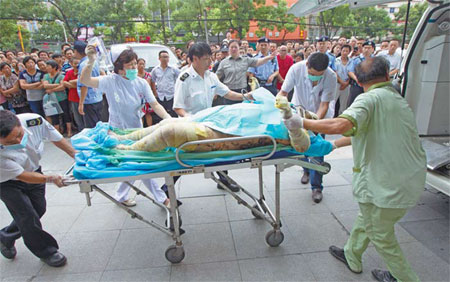Horrific nightmare at Kunshan factory
By Wei Tian and Cang Wei and Su Zhou (China Daily) Updated: 2014-08-04 07:45
 |
|
Medical staff with the Kunshan Hospital of Traditional Chinese Medicine transfer an injured patient on Saturday. Gao Erqiang / China Daily |
But Cheng said many of his former workmates quit within three months because they couldn't stand the dusty environment and heavy workload.
"Night shifts are very common, and overtime on weekends is routine. Workers are covered with aluminum powder. They look like terracotta warriors," Cheng said.
"We had 20 to 30 new employees joining us every day, and no one was given safety training of any sort at all."
Cheng said there was a fire several months ago at the same factory, but it didn't attract attention.
'Golden hours'
Of the 186 people injured in the blast, 137 were transferred to hospitals of nearby cities.
The local health department said all of the injured have deep burns. Most suffered burns to more than 90 percent of their bodies. Even the victims with the lightest wounds have lost 50 percent of their skin, the department said.
Many burn specialists, including some from Beijing, Shanghai and Nanjing, have hurried to Kunshan to help.
Xiong Meng, director of the burns and plastic surgery department of Nanjing's Zhongda Hospital, said the "golden hours" for saving the life of a severely burned patient are the first 36 to 48 hours, and specialists have been working frantically to provide treatment in time.
"After losing the protection of the skin, a person will fall into a coma because of the loss of a large amount of fluid. During the coma, which usually lasts between 36 and 48 hours, lots of blood needs to be put back into the body," Xiong said.
"The shorter the coma is, the better the patients will recover during the acute infection period and the following recovery period."
Pu Jianguo, one of the bus drivers who transported patients to a hospital at the request of the police, said he was stunned when he saw the injured.
"I realized how serious the situation was the moment I saw their wounds," Pu said. "Usually the trip to the hospital would take me more than 50 minutes, but I finished it in less than 20 on Saturday.
"They could only lie on the floor of the bus, so a 10-meter-long bus can only take about four to six people," Pu said. "The bus needed to be washed from inside out to get rid of the scorched smell before it could be used again."
Responding to the pleas for blood after the Kunshan branch of the Red Cross Society of China reported a shortage, many residents of Jiangsu province stood in queues outside blood-collection stations. The society's four stations reached their capacity by late afternoon. But more blood is needed.
According to Sun Jun, director of the provincial blood center, 100,000 milliliters of blood and 36,000 milliliters of red blood cells were transferred to Kunshan.
More than 200 people also volunteered to receive training by Kunshan's psychological counseling association. The volunteers worked with more than 100 psychiatrists to offer help to the patients' relatives who were staying at temporary shelters.
Complaints unheeded
Workers have posted comments online saying they have suffered from the effects of dust in their lungs, but after they complained, production continued as usual.
"For years we've received baskets of notices and supervisory reports from various levels, but everything remains the same. No one ever takes any action," an employee at Zhongrong, who declined to be named, told Beijing News.
Just two weeks ago, Wang Xiangming, director of the work safety administration in Jiangsu province, told the media that the number of accidents and casualties had dropped for 12 years, and the safety situation was "improving overall".
By contrast, Lu Jun, mayor of Kunshan, characterized Saturday's accident as "severe".
An initial probe indicated the explosion may have been triggered by a flame that ignited airborne dust inside the workshop. The authorities have detained two company officials.
A number of enterprises, including Foxconn Technology Group in Kunshan, have suspended work for safety checks, said Zhang Jun, director of the Kunshan Administration of Work Safety. Production will resume based on the results of the checks, China News Service reported.
Experts called for intensified measures at factories to prevent similar accidents. "Dust suspended in the air in the right concentration can cause explosions. Even a material that does not normally burn in large pieces, such as aluminum, becomes explosive in certain conditions when it's suspended in powder form," said Wu Chunping, a senior engineer at Beijing General Research Institute of Mining and Metallurgy.
"Generally speaking, for those workshops with high dust concentrations, precautionary measures are the key. Explosions will happen in a few milliseconds," Wu said. "Factories should put dust-monitoring equipment in the workplace to monitor the density."
Wu added that multiple explosions could have occurred in rapid succession because the whole workplace would have been filled with aluminum particles after the first blast, and that could have led to a series of quick blasts. Also, hot aluminum particles in the air would ignite workers' clothes, he said.
Xinhua contributed to the story.
Contact the writers at weitian@chinadaily.com.cn
Related:
Reporter's log: Respect for life is needed to prevent tragedies
- Govt encourages people to work 4.5 days a week
- Action to be taken as HIV cases among students rise
- Debate grows over reproductive rights
- Country's first bishop ordained in 3 years
- China builds Tibetan Buddhism academy in Chengdu
- Authorities require reporting of HIV infections at schools
- Typhoon Soudelor kills 14 in East China
- Police crack down on overseas gambling site
- Debate over death penalty for child traffickers goes on
- Beijing to tighten mail security for war anniversary







